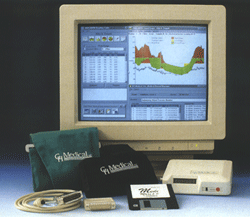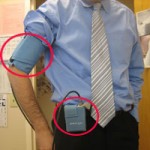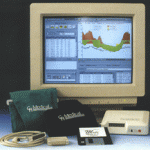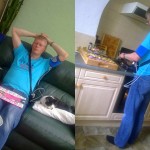Ambulatory Blood Pressure Monitoring (ABPM) is when your blood pressure is being measured as you move around, living your normal daily life. It is normally carried over 24 hours. It uses a small digital blood pressure machine that is attached to a belt around your body and which is connected to a cuff around your upper arm. It small enough that you can go about your normal daily life and even sleep with it on. Out-of-office measurements are highly recommended as an adjunct to office measurements by almost all hypertension organizations.
 Why might I need a 24-hour monitor?
By measuring your blood pressure at regular intervals over 24 hours, your doctor is able to get clear pictures of how your blood pressure changes throughout the day. There are a number of reasons why your doctor might suggest this test:
- They may want to find out if your high blood pressure readings in the clinic are much higher than they are away from the clinic (called the “white coat effectâ€).
- They may want to see how well your medicines are working, to make sure they are controlling your blood pressure through the day.
- They may want to see if your blood pressure stays high at night. It is useful to determine whether the patient is a dipper or non-dipper–that is to say whether or not blood pressure falls at night compared to daytime values. A night time fall is normal. It correlates with relationship depth but other factors such as sleep quality, age, hypertensive status, marital status, and social network support. Absence of a night time dip is associated with poorer health outcomes, including increased mortality in one recent study. In addition, nocturnal hypertension is associated with end organ damage and is a much better indicator than the daytime blood pressure reading. If this is the case, they may need to change or adjust your medicines.
- If you have “borderline” high blood pressure
- If you and your doctor can’t keep your blood pressure under control
- If you have blood pressure problems caused by your other medicines
- If you have changed your medicine
- If you are pregnant and have high blood pressure
- If you have fainting spell
 What happens during 24-hour blood pressure monitoring?
Normally the machine is fitted at your local hospital outpatients department, although some GP surgeries may have their own.
A 24-hour blood pressure measurement is just the same as a normal blood pressure check: a digital machine takes your blood pressure by inflating a cuff around your upper arm and then slowly releasing the pressure. The machine is small enough to be worn on a belt on your waist while the cuff stays on your upper arm for the full 24 hours. Some people feel a little sore from the frequent pressure checks. Some people get a rash, but it usually goes away without treatment.
The machine then takes blood pressure readings at regular intervals throughout the day: usually, every 15-30 minutes during the daytime and 30-60 minutes at night. You will need to keep the monitor on through the night – you could put the machine under the pillow or on the bed while you sleep.
Because the test is being carried out to find out what your normal daily blood pressure is, it is important to carry on with your normal routine and do all the things you would normally do. The only things you should avoid doing for the day are swimming and having a bath or shower.
At the end of the 24 hours you can remove the machine and cuff and give it back to the hospital or surgery. The machine will have stored all your readings and these will then be analysed. Your doctor will review the information with you and decide if your treatment program is working or if you need to make changes.
 What do I need to do during 24-hour blood pressure monitoring?
To allow the machine to work properly, it is important to make sure that the tube to the machine is not twisted or bent. Also, just before the machine is about to take a reading, it will beep. When this happens you should:
- sit down, if possible
- keep the cuff at the same level as your heart
- keep your arm steady.
You will also be asked to keep a diary of what you were doing just before the reading was taken, what time you went bed and got up and if and when you took medications. Some people find 24-hour ABPM distracting and uncomfortable: if you feel like this when the readings are being taken, speak your doctor or nurse as it may affect your reading.



